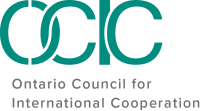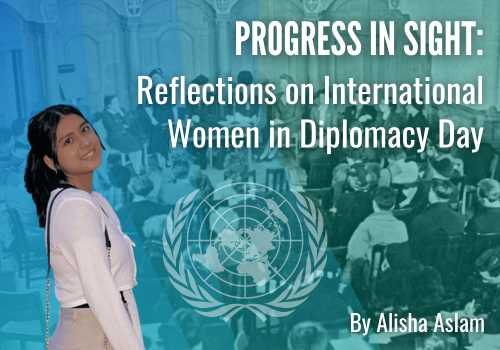Reflections on International Women in Diplomacy Day: Progress in Sight
Alisha Aslam | July 15, 2025
Last month, on June 24, the world observed International Women in Diplomacy Day. Celebrated on blogs and Instagram stories, by organizations, influencers, and everyday people, at schools, and on international stages– this day recognized the work we’ve done so far, the work we are doing, and the work that lies ahead in terms of bringing women and their contributions to diplomacy under the global spotlight.
International Women in Diplomacy Day was established by the UNGA at its 76th Session in 2022. It stands as a reminder of SDG 5, which calls for the achievement of gender equality by 2030. While this goal should be– and already is– on our radar, especially at OCIC– we must also bring to light the fact that the road to gender equality is an ongoing process that transcends the power of any single generation.
2030 should be a milestone, not a final check-in-the-box to achieving gender equality. This is why gender equality, and more specifically the representation of women in diplomacy is not a finite process. It is perpetual. But it is only in understanding how fragile and precious this kind of progress is that we realize we must never take it for granted. The recognition of women in diplomacy does not just come about. It must be deliberately pursued.
This is not something that has always been easy for the world. Women have been spearheading diplomacy since the founding of international relations, but have not always been acknowledged, much less celebrated. Women were instrumental in shaping the documents that outline how we are to treat each other in the world, no matter where in the world we find ourselves.
Credit: UN Photo/Marcel Bolomey
At the UN, Hansa Mehta of India was behind changing the phrase “All men are born free and equal” to “All human beings are born free and equal” in Article 1 of the Universal Declaration of Human Rights (‘Declaration’).
Minerva Bernardino of the Dominican Republic argued for inclusion of “the equality of men and women” in the preamble of the Declaration. She also was behind the push to include women’s rights in the UN Charter, which in 1945 became the first international agreement to recognize the equal rights of men and women.
As Chairperson of the Commission on the Status of Women in 1948, Marie-Hélène Lefaucheux of France successfully advocated for a mention of non-discrimination based on sex to be included in Article 2 of the Declaration, and its final text states, “Everyone is entitled to all the rights and freedoms set forth in this Declaration, without distinction of any kind, such as race, colour, sex, language, religion, political or other opinion, national or social origin, property, birth or other status.”
It is because of these women and more, that the world has made strides in diplomacy, since the very beginning of diplomacy. Without them, these documents may have ended up looking different from what they are today. It is because these women dared to dream and step onto the world stage that women today can now soar even higher.
However, what we have seen to-date in the world also shows us that these women were interested in more than enshrining laws. Codifying these rights was just the first step. We must ensure that we are guaranteeing what we etch into the global fabric of human rights. A large part of institutional representation is creating the mechanisms in diplomatic institutions that achieve the big ideas we’ve enshrined in charters for decades.
Diplomacy seems like a very formal undertaking, but equally, if not more important, are the informal undertakings that women deserve to partake and excel in. If a woman is to possess the right to make statements and participate in debates in the walkways of diplomacy, then she also deserves to feel comfortable and safe in the process. The discussions that happen on the sidelines at summits, the drafts that circulate behind closed doors before signing the final documents– are where we need women as well. Celebrating women in diplomacy means welcoming them in all environments where diplomacy happens. It means recognizing that their excellence and insight is something that can only benefit, not harm diplomacy. This is true representation.
This path is one that women cannot walk on alone. Everyone should be part of the process, because when women are not recognized for their contributions, we all are at a loss.
And to those women looking to go into diplomacy, as well as to those who are already in the field but worry about gaining the space, comfort, and appreciation they deserve, I ask you: if the women who pioneered our representation on the world stage dared to start the world in this direction, will you dare to continue?
 Alisha Aslam OCIC Youth Policy-Makers Hub Member
Alisha Aslam OCIC Youth Policy-Makers Hub Member
Alisha Aslam (she/her) strives to inspire others to channel their voices in unity. Studying International Relations at the University of Toronto, her interests lie in understanding how national and global communities can effectively collaborate on issues and translate it into real change. She recently served as a National Bilingual Young Leader at Français Pour l’Avenir, worked with OneChild Canada, and co-authored an article with Plan Canada’s CEO on challenges women activists face online.







